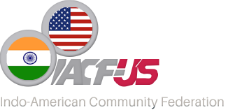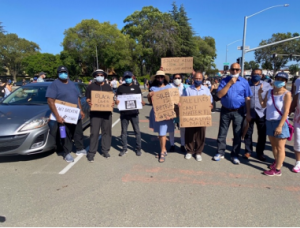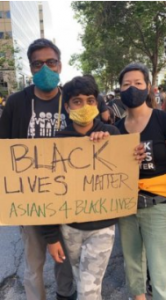RITU JHA
Prominent Indian-American voices have hailed Washington, DC-based Rahul Dubey, who gave shelter to over 70 protesters, fed them and protected them from being arrested.
The protesters were demonstrating against the death of 46-year-old George Floyd, an African-American man, who died on May 25 after white police officer pinned him down with a knee on his neck in Minneapolis. The incident has brought America to a crossroad and sparked protests, looting and more police violence.
“Sometimes people are heroes and they just don’t know it,” said MR Rangaswami, co-founder Sand Hill Group, about what Dubey did.
Rangaswami, also the founder of Indiaspora, called Dubey’s a humanitarian act.
“He did the right thing, kudos to him,” Rangaswami told indica about Dubey.
When this correspondent asked if he would do what Dubey did if he was faced with such a situation, Rangaswami said: “It’s easy to say ‘sure’, but you have to be in the live situation and then you know your true character.
“I think, I would do that (what Dubey did),” Rangaswami said. “He did the right thing.”
Kanwal Rekhi, veteran venture capitalist and co-founder of TiE (The Indus Entrepreneurs), said the George Floyd protests had evoked a sense of deja vu for him.
“It’s like a back to the future feeling,” Rekhi told indica. “I was here when the sixties’ civil rights protests happened. A whole lot of progress was made but the job was not finished. It feels like hase two of the civil rights struggle. I feel that this time it is also a counter movement to Trumpism. Very glad and impressed to see senior military people finally speaking up.”
Jeevan Zutshi, founder of the Indo-American Community Federation, was part of a anti-policebrutality protest on Thursday in Fremont, California, said the protests this time had a sense of urgency.
He said he came to this country 48 years ago, but “what we have been going through never happened at this level. So many times, so many things have happened; this is on such a massive scale.”
Sharing his thoughts on Dubey’s quick action, Zutshi said: “I would do the same thing and might go further ahead.”
He said African Americans have been given a raw deal.
“Very unfortunately, the black people were brought here as slaves and unfortunately not much has changed,” Zutshi said. “We have a community that has not been taken care of, and President Obama rightly said there has to be a major change in the policy.
“The question that arises is why are the blacks not doing well like other immigrants. We have to go to the roots,” he said.
He said the root causes of racism must be addressed.
“It starts with education, it starts with opportunities, it starts with changing laws and rules, and companies should actively hire Africa Americas and give them opportunity,” Zutshi said.
Rangaswami agreed, and said it was not enough to show solidarity with blacks.
“Our community needs to hire black people and help educate underprivileged kids, mentor them. Again, this time I see some hope, “ Rangaswami said.
Silicon Valley-based activist Gopal Dayaneni, who serves on the Planning Commission at Movement Generation in the Bay Area, was at a protest on Sunday in Oakland.
He told indica he participated along with his son Kavi and partner Miya Yoshitani.
“One of the most inspiring moments was when we marched by Kaiser Hospital and dozens of hospital workers — nurses, doctors, assistants, technicians, security — all were out clapping and cheering for the march for black lives while they themselves were cheered for the work they are doing to save lives,” Dayaneni said.
He said that airbrushing police violence against blacks as a case of a few bad apples was disingenuous, and the easy way out.
“This is not about bad apples, this is about the poison fruit of policing. Modern policing is a legacy of slavery and, not surprisingly, consistently and predictably reproduces white supremacy and anti-blackness,” Dayaneni said.
Asked what was the solution, Dayaneni said the solution would come from the communities.
“What we have learned during this pandemic is that we do know how to care for each other and be in community,” he said. “The solution to harm and hurting is care and compassion, not policing and prisons.”
He, too, echoed Rangaswami and Zutshi in underlining the need for social justice.
“If we invest in education, right livelihoods, healthy food, and meeting peoples’ needs, then we wouldn’t need to rely on the old tools of enforcement that we inherited from colonialism and slavery — namely policing, punishment and prisons. It clearly doesn’t work, so it’s time to try something new, such as transformative justice and community care,” Dayaneni said.




